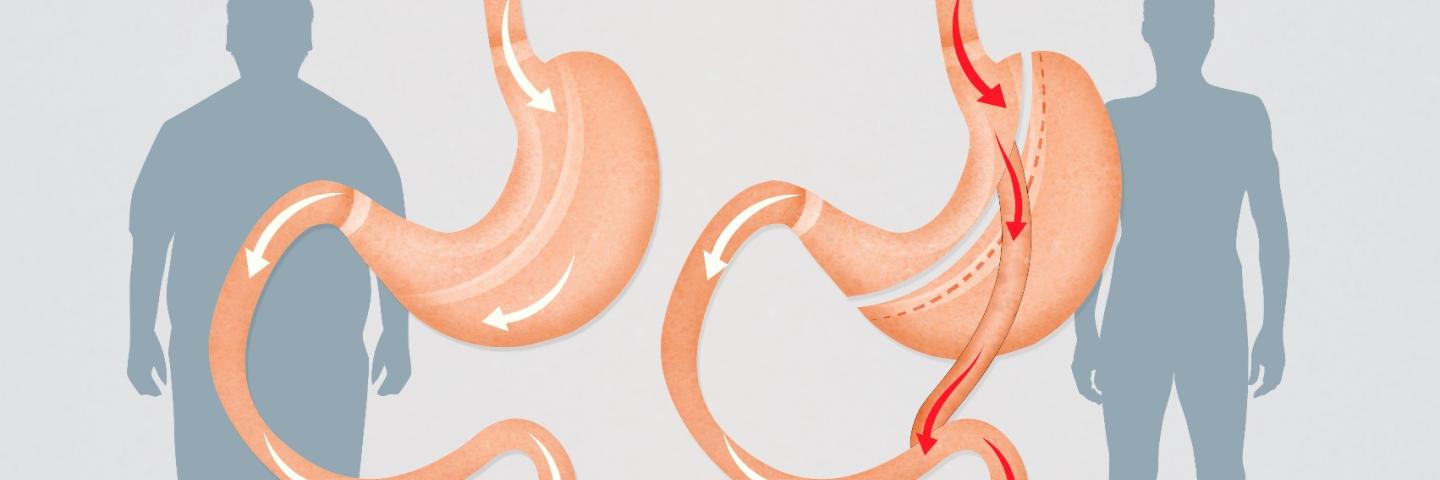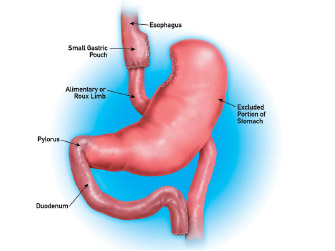
Laparoscopic Gastric Bypass
On this page, you’ll learn more about our gastric bypass surgery, what it is, and how it works. You’ll also learn more about potential gastric bypass complications, and the benefits this type of procedure offers you for weight loss. The Roux-en-Y gastric bypass surgery, commonly called gastric bypass, is a popular weight loss surgery that has been referred to as the gold standard of bariatric surgery. The gastric bypass has been performed for many years and is the oldest weight loss operation.
Patient Journey
From beginning to end, the journey for a patient undergoing bariatric care is full of changes. It will require persistence and discipline, but in the end it is all worth it. Feel free to learn more about the patient journey.
The Roux-en-Y gastric bypass procedure is usually performed laparoscopically (i.e. keyhole surgery with a telescope). In this gastric bypass operation, the stomach is completely divided with a stapler to leave a pouch that initially measures only 25 mls. The small bowel is divided and the divided end is brought up and joined to the small stomach pouch. The other small bowel end is joined back onto the small bowel about a meter down from the stomach. Thus the whole stomach is bypassed apart from a tiny pouch. This operation works in two ways:
- Restriction: the small pouch restricts the volume of food you can eat at one meal
- Malabsorption: the reconfiguration of the small intestine, results in some of the food you eat passing through the intestine without being absorbed.
Gastric bypass is an effective weight loss operation in most patients (although where patients end up is always dependent on how they use the tool they are given). Advantages of gastric bypass:
- More rapid weight loss than banding
- Dumping offers a useful deterrent to eating high calorie food and drinks
- Long track record- the gastric bypass operation has been around in various forms for 30 years
- There is nothing to break or erode
- About 60-70% EWL over 2 years
Gastric Bypass and Diabetes
Diabetes is a leading cause of death in the United States, so it is important to recognize that the bypass can be a particularly good choice for patients who have type 2 diabetes. In studies, patients with diabetes who undergo gastric bypass surgery experience a remission of their diabetes as soon as days after their operation. This is particularly interesting because there is no way that the weight lost over a few days could lead to remission of diabetes. There appears to be a physiological change that happens from gastric bypass surgery that may treat diabetes. Although this is not the case for all patients, those with diabetes should be considered for gastric bypass surgery. According to the American Society for Metabolic and Bariatric Surgery (ASMBS), approximately 80% of patients who have gastric bypass surgery go into remission of their type 2 diabetes.

Disadvantages of gastric bypass:
- This procedure has a slightly higher serious complication rate than some of the other operations because of multiple staple lines and bowel connections that can potentially leak.
- There is a need to take oral supplements of iron, vitamins, and calcium for life, and some patients also need Vitamin B12 injections.
- Recovery time is slightly longer than after other procedures.
- The Insurance experts at the New York Bariatric Group will verify your insurance benefits for you free of charge.
- The first step is to call or contact us to make an appointment with one of the experienced surgeons at the New York Bariatric Group.
- As a candidate for bariatric surgery, you can expect to undergo a series of consultations and evaluations. A detailed comprehensive program has been developed to ensure your long-term health and safety pre- and post-surgery.
- Dr. Garber explains how you can initiate the process to become a new healthier you.
- You will receive extensive patient education from our psychologist who will perform a psychological evaluation that is required by the hospital and most insurance providers.
- Meet with our registered dietitian to discuss healthy lifestyle changes pre- and post- weight loss surgery.
- Participate in studies to determine your pulmonary, gastrointestinal, and cardiovascular health. You can usually complete this entire work-up in one day in our office.
- After the work-up is completed you will meet with your surgeon for a second visit to be scheduled for surgery. Our insurance experts will then obtain approval from your insurance company.
- You will be scheduled for preadmission testing at the hospital. During this testing you will meet our bariatric coordinator who will give you a complete educational class on how to prepare for surgery? What is going to happen when you arrive at the hospital on your surgery day, as well as what to expect when you go home from the hospital.
It is important to remember that The New York Bariatric Group and its affiliate Bariatric Center has been recognized as a “MBSAQIP and its Accredited Center-Comprehensive”. This designation provides the public with the assurance that our practice provides complete care for patients before, during, and after bariatric surgery, and we have a proven track record verified by an independent review organization.
Based on this designation, we have proven that your hospital stay, will provide all that is necessary for a fast and pleasant recovery. From our full time bariatric nurse coordinator to specialized equipment that is needed to fulfill the needs of patients post-bariatric surgery, including bariatric chairs, beds, gowns, and other specialized equipment. At the end of your hospital stay, you will find that our program is designed solely for the purpose of the bariatric patient.
The surgery usually takes only 75-90 minutes and is performed under general anesthesia. You will usually spend two nights in the hospital. On the first morning after the surgery, you will undergo a GI series to make sure everything looks good. You will then be started on a liquid diet. On postoperative day two, you will start on a pureed diet. Once you are tolerating pureed food you will be discharged home.
Recovery Period
The recovery period after Gastric Bypass surgery is usually about 2 weeks until you can return to work.
After Bariatric Surgery Lifestyle Changes
Adjusting to your post-bariatric surgery diet and lifestyle is one of the most important keys to your long-term success. Develop healthy daily habits based on eating in moderation that match your new body instead of failed eating patterns that can ultimately lead to poor health, fatigue, depression, and attempts at binge eating. Making a commitment to lifestyle change will bring fast & substantial weight loss. Let us show you how.
Is permanent weight loss after bariatric surgery possible? Absolutely! But you aren’t going to find weight loss success by merely having restrictive weight loss surgery. Get thin quick schemes are a dime a dozen. They are usually costly plans that promise fast weight loss. They work too – temporarily. The problem with fast weight loss plans alone is they are not long-term solutions to losing weight and keeping it off.
Tips To Avoid Feeling Deprived While Dieting (Even Before Entering Our Program)
- Learn and adhere to a sensible diet plan
- Think lifestyle change rather than sticking with the diet mentality
- Find new and exciting ways to stay motivated
- Indulge in your bariatric treats once in a while
- Find enjoyment in activities other than eating
- Reward yourself for reaching weight loss goals, but not with food
- Connect with friends and ask for support
- Be accountable for your eating, even on your down days
- Eat small meals at specific schedules to avoid feeling hungry
- Don’t skip meals
- Create lighter versions of your favorite meals that you can enjoy eating
Post-bariatric surgery diet guidelines are fully discussed with patients during their comprehensive nutritional evaluation prior to surgery. Patients follow a Stage I diet for the first 4-6 weeks after surgery. This includes all foods that are soft, mushy, and/or pureed consistencies. Examples of pureed foods are anything blended and smooth such as baby foods, fruitless yogurt, cottage cheese, and hummus. Soft/mushy foods include chopped up ground meats such as turkey, veal, chicken or pork, soft, white, flaky fish that is baked, broiled or grilled, scrambled eggs, and egg whites. Solid foods of all kinds should be completely avoided until weeks 4-6 or when the surgeon allows it.
This practice stresses the importance of good hydration, using non-carbonated, decaffeinated, sugar-free beverages. We always promote good quality proteins to be consumed from day one after bariatric surgery. High sugar and high-fat foods are limited and very specific guidelines are provided to help equip patients with a clear-cut way to determine which foods are healthy for them to eat. Fruits, vegetables, and high fiber foods are reintroduced after the first 3 months. All patients get full details on dietary progression from our experienced nutritionists at their follow-up visits.
The New York Bariatric Group is fully dedicated to promoting high standards for nutritional health. That doesn’t mean that patients should not enjoy eating. The New York Bariatric Group weight loss program has been designed to help patients lose weight rapidly, but provides you with resources to help enjoy your new lifestyle by keeping the flavor and fun in eating. Each patient is given the option to enroll in our Store. We brought together great tasting meals and supplements for breakfast, lunch, dinner, and even snacks which can be ordered on our website.
